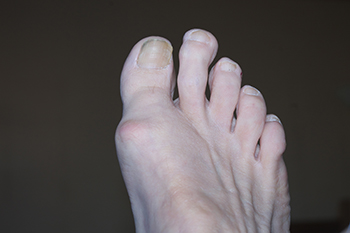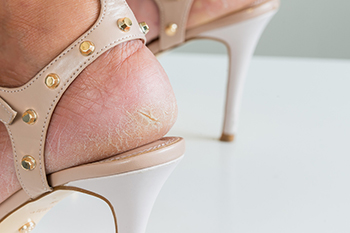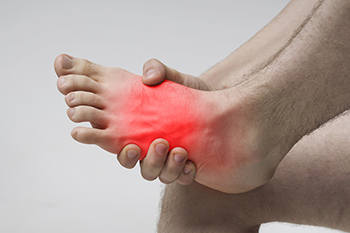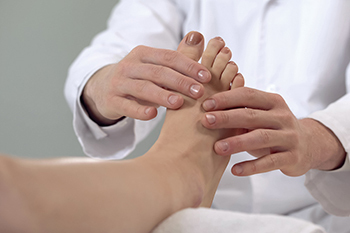Connect With Us
Blog
Items filtered by date: October 2022
Facts About Morton’s Toe

If your second toe is longer than your big toe, you have something known as Morton’s toe. This is not to be confused with Morton’s neuroma, which is an inflammation of the nerve near the ball of the foot. Morton’s toe is a congenital bone formation, where the first metatarsal, the long bone that connects the toe to the back of the foot, is shorter than the second metatarsal. This causes the second toe to appear longer. The formation may affect the biomechanics of the foot and result in arch pain. Aches and pains in the foot are generated by the way your weight is distributed when you walk, run, or jump. Treatment options for Morton’s toe include stretching and strengthening exercises, certain pain relief medication, and custom orthotics. In more serious cases, surgery may be an option. Because the tip of the second toe sticks out further inside a shoe, calluses may develop. It may help to wear shoes that allow ample room in the toe box to accommodate the longer second toe. For more information, please consult a podiatrist.
Toe pain can disrupt your daily activities. If you have any concerns, contact one of our podiatrists of Crosstown Podiatry. Our doctors can provide the care you need to keep you pain-free and on your feet.
What Causes Toe Pain?
Most severe toe pain is caused due to a sports injury, trauma from dropping something heavy on the toe, or bumping into something rigid. Other problems can develop over time for various reasons.
Toe pain can be caused by one or more ailments. The most common include:
- Trauma
- Sports injury
- Wearing shoes that are too tight
- Arthritis
- Gout
- Corns and calluses
- Hammertoe
- Bunions
- Blisters
- Ingrown toenails
- Sprains
- Fractures (broken bones)
- Dislocations
When to See a Podiatrist
- Severe pain
- Persistent pain that lasts more than a week
- Signs of infection
- Continued swelling
- Pain that prevents walking
Diagnosis
In many cases the cause of toe pain is obvious, but in others, a podiatrist may want to use more advanced methods to determine the problem. These can range from simple visual inspections and sensation tests to X-rays and MRI scans. Prior medical history, family medical history, and any recent physical traumatic events will all be taken into consideration for a proper diagnosis.
Treatment
Treatments for toe pain and injuries vary and may include shoe inserts, padding, taping, medicines, injections, and in some cases, surgery. If you believe that you have broken a toe, please see a podiatrist as soon as possible.
If you have any questions please feel free to contact our offices located in Wayne, Montclair, and Randolph, NJ . We offer the newest diagnostic tools and technology to treat your foot and ankle needs.
Reasons Cracked Heels Can Develop

The foot condition that is known as cracked heels often comes from having extremely dry skin. This can happen for a number of reasons, including medical conditions consisting of eczema and psoriasis. Additionally, wearing shoes that have an open back may cause this ailment to develop, or it may also come from standing on hard surfaces for the majority of the day. Cracked heels can cause pain and discomfort, and mild relief may be found when a good moisturizer is frequently used. Many patients find it helpful to soak their feet in warm water, although this may only provide temporary relief. There are effective methods that may help to prevent cracked heels from developing, including wearing shoes that have a closed back, and choosing what type of surface to stand on, if possible. It may help to avoid taking hot showers, in addition to refraining from using lotions that may contain alcohol. If you have cracked heels, please consult with a podiatrist who can recommend the correct treatment option for you, which may include using a prescription cream.
If the skin on your feet starts to crack, you may want to see a podiatrist to find treatment. If you have any concerns, contact one of our podiatrists from Crosstown Podiatry. Our doctors can provide the care you need to keep you pain-free and on your feet.
Cracked Heels
It is important to moisturize your cracked heels in order to prevent pain, bleeding, and infection. The reason cracked heels form is because the skin on the foot is too dry to support the immense pressure placed on them. When the foot expands, the dry skin on the foot begins to split.
Ways to Help Heal Them
- Invest in a good foot cream
- Try Using Petroleum Jelly
- Ease up on Soaps
- Drink Plenty of Water
Ways to Prevent Cracked Heels
- Moisturize After Showering
- Skip a Shower
- Keep Shower Water Lukewarm
- Don’t Scrub Your Feet
If you are unsure how to proceed in treating cracked heels, seek guidance from a podiatrist. Your doctor will help you with any questions or information you may need.
If you have any questions, please feel free to contact our offices located in Wayne, Montclair, and Randolph, NJ . We offer the newest diagnostic and treatment technologies for all your foot care needs.
Dealing With Stress Fractures of the Foot

Repetitive pressure on the feet can cause stress fractures, which are tiny hairline cracks in the bones. The long bones of the feet, known as metatarsals, are the most common location of stress fractures. Heavy training or exercising for long periods, such as getting ready for a marathon, increases the risk of getting stress fractures. Women are more likely to sustain stress fractures than men because of lower bone density. Symptoms, which usually develop slowly, include pain, swelling, and tenderness in the affected area. The first and best way to handle stress fractures is to stop the activity that caused them. If symptoms last more than a week after that, it is a good idea to see a podiatrist who can examine the feet using X-rays or other imaging tests. Once the severity of the fractures is understood, the podiatrist can offer further treatment solutions, including medication, a walking boot or brace, and in extreme cases, a cast or splint. As an active athlete, it may be wise to add a podiatrist to your medical team.
Activities where too much pressure is put on the feet can cause stress fractures. To learn more, contact one of our podiatrists from Crosstown Podiatry. Our doctors can provide the care you need to keep your pain free and on your feet.
Dealing with Stress Fractures of the Foot and Ankle
Stress fractures occur in the foot and ankle when muscles in these areas weaken from too much or too little use. The feet and ankles then lose support when walking or running from the impact of the ground. Since there is no protection, the bones receive the full impact of each step. Stress on the feet can cause cracks to form in the bones, thus creating stress fractures.
What Are Stress Fractures?
Stress fractures occur frequently in individuals whose daily activities cause great impact on the feet and ankles. Stress factors are most common among:
- Runners
- People affected with Osteoporosis
- Tennis or basketball players
- Gymnasts
- High impact workouts
Symptoms
Pain from the fractures occur in the area of the fractures and can be constant or intermittent. It will often cause sharp or dull pain with swelling and tenderness. Engaging in any kind of activity which involves high impact will aggravate pain.
If you have any questions please feel free to contact our offices located in Wayne, Montclair, and Randolph, NJ . We offer the newest diagnostic and treatment technologies for all your foot and ankle needs.
Why Live with Pain and Numbness in Your Feet?
Can Gout Attacks Be Prevented?

Patients who experience gout attacks are often familiar with the debilitating pain they can cause. Gout occurs as a result of crystals that form in the joints of the big toe and can develop for various reasons. Genetics can contribute significantly to the development of gout, in addition to having an abnormal metabolism that produces excess uric acid. It is seen in the joints of the body as crystals and can produce extreme pain and discomfort. This may come from eating foods that have high levels of purines like shellfish, red meat, and drinks that are made with large amounts of sugar. Drinking excess alcohol may also lead to gout so it is beneficial to drink in moderation. Gout attacks may be prevented by drinking plenty of water daily, consuming healthy foods, and practicing a gentle exercise program. Gout patients should be under the care of a podiatrist. It is strongly advised that you contact a podiatrist who can provide effective prevention techniques as well as treatments that are best for you.
Gout is a painful condition that can be treated. If you are seeking treatment, contact one of our podiatrists from Crosstown Podiatry. Our doctors will treat your foot and ankle needs.
What Is Gout?
Gout is a form of arthritis that is characterized by sudden, severe attacks of pain, redness, and tenderness in the joints. The condition usually affects the joint at the base of the big toe. A gout attack can occur at any random time, such as the middle of the night while you are asleep.
Symptoms
- Intense Joint Pain - Usually around the large joint of your big toe, and it most severe within the first four to twelve hours
- Lingering Discomfort - Joint discomfort may last from a few days to a few weeks
- Inflammation and Redness -Affected joints may become swollen, tender, warm and red
- Limited Range of Motion - May experience a decrease in joint mobility
Risk Factors
- Genetics - If family members have gout, you’re more likely to have it
- Medications - Diuretic medications can raise uric acid levels
- Gender/Age - Gout is more common in men until the age of 60. It is believed that estrogen protects women until that point
- Diet - Eating red meat and shellfish increases your risk
- Alcohol - Having more than two alcoholic drinks per day increases your risk
- Obesity - Obese people are at a higher risk for gout
Prior to visiting your podiatrist to receive treatment for gout, there are a few things you should do beforehand. If you have gout you should write down your symptoms--including when they started and how often you experience them, important medical information you may have, and any questions you may have. Writing down these three things will help your podiatrist in assessing your specific situation so that he or she may provide the best route of treatment for you.
If you have any questions, please feel free to contact our offices located in Wayne, Montclair, and Randolph, NJ . We offer the newest diagnostic and treatment technologies for all your foot care needs.

